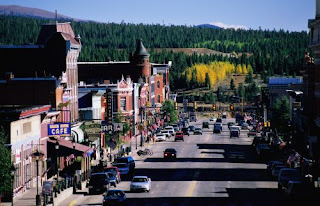If you cycle because you want to, non-cyclists probably have referred to you by any number of adjectives and epithets. One of them might be "crazy."
I'll admit that I actually called one of my fellow cyclists "crazy." So, however, did other members of our "crew." Actually, Ray Tirado wasn't crazy so much as he was fearless and seemingly incapable of feeling physical pain. (All right, some might argue that such a combination of traits might add up to a listing or two in the DSM.) Most of our rides together were off-road and he made jumps and descents that, even when I still had most of my insecurity and testosterone, I wouldn't have dared. Even on a straightaway on a the road, under a clear sky with the wind at our backs, I could see that his attitude toward riding, and life, was different from anything I could imagine.
That said, I admire him to this day. Even though he seemed to be riding "gonzo," whether on off his bike, he always seemed to understand who he is--which meant that the risks he took weren't just acts of hubris: He was pushing his boundaries because he understood what they were and didn't want them to be boundaries any more.
I must admit that, to this day, I value few compliments I've ever received for anything more than the ones he gave me for my riding (!) and "for being you," as he once said. "You know why you ride, or do anything you do."
He got half of that statement right. To this day, I sometimes do things without knowing why. Cycling is not one of them, which is why it's one of the few things I can't imagine my life without.
You see, after half a century of dedicated riding--which has included commuting, touring, racing, messenger work, riding on and off the road in all kinds of conditions in about two dozen different countries--I can say that I understand the risks of sluicing through city traffic, barreling down a rocky hill or pedaling into the teeth of a mistral as well as anyone.
And I know, as "Crazy Ray" surely did, that those risks are outweighed by the benefits, not the least of which are the ones for our mental health. One of the world's most influential people also understands as much--which is why he got me to thinking about Ray.
He's just published his latest book, Rationality: What It Is, Why It Seems Scarce, Why It Matters. One way you know he's an academician is that the book title has a colon in it. But he's more than that: a real intellectual, a thinker. That means that, as much as he enjoys cycling, it's not an unconscious or reflexive act for him. "Given the value you put on your life and the fact that there's even a very small probability of getting killed," he asks, "does it outweigh the pleasure and health benefits of continuing to ride?"
 |
| Steven Pinker. |
The people who can't understand why we ride are usually focused on the first part of his question: the risk. But Steven Pinker, a Harvard psychologist who specializes in psycholinguistics and social relations, has been thinking about why he rides for as long as he's been riding. For example, as a kid, he tried to understand how he could remain upright while riding, which would lead him to learn about the brain's workings and how they relate to Newton's law of gravity. Also, while growing up, he heard about men--including three uncles and several of his father's friends--dying prematurely of heart attacks. So, he says, as a young man he resolved to keep himself in good cardiovascular health. His studies in neuroscience would confirm the wisdom of his choice: "physical exercise is one of the best ways to extend brain health."
So, the Harvard researcher and my old riding buddy--who, by the way, was a plumber--would agree on this: Riding a bicycle is as about as rational as anything a human being can do.




























